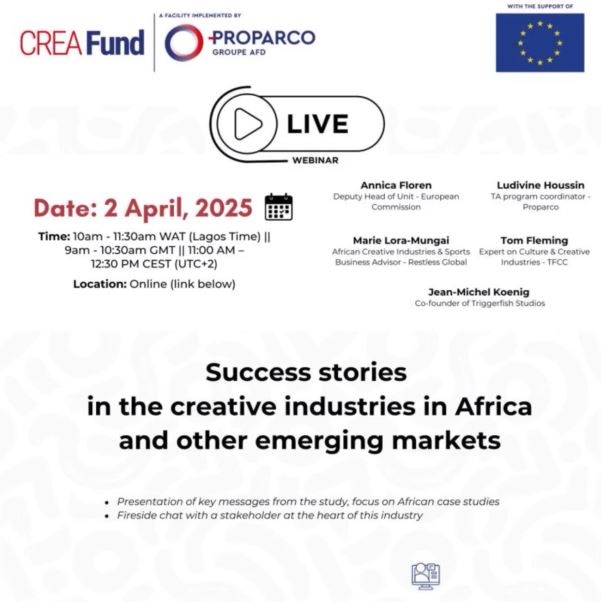Share the page
Cultural and creative industries: two new studies published by Proparco
Published on

As part of the CREA Fund facility, supported by the European Union, Proparco publishes two studies exploring the dynamics and prospects of the cultural and creative industries (CCI) in Africa, several emerging markets and the Caribbean. These studies highlight the opportunities, challenges and strategies needed to support this fast-growing sector, a key driver of sustainable and inclusive development.
These two studies were carried out as part of the technical support provided by the CREA Fund programme managed by Proparco and supported by the European Union, with the aim of deepen market knowledge of the CCI and, ultimately, encourage greater investment in the sector.
1st study: "Success stories in the creative industries in Africa and other emerging markets"
The first report, entitled "Success Stories in the Creative Industries in Africa and other Emerging Markets" analyzes the journeys of 12 African creative enterprises across six countries, comparing them with 10 companies from other emerging markets such as India and Vietnam. While emphasizing that CCIs contribute approximately $2.3 billion annually to global GDP, with an impressive annual growth rate of 5 to 7 percent, the report notes that the sector remains a largely untapped opportunity.
Among the major challenges identified are the lack of financing (with 70% of entrepreneurs self-funding due to limited access to loans or venture capital), piracy and intellectual property issues that significantly constrain profitability, as well as high production costs and limited internet access, all of which hinder the sector’s development.
In response to these challenges, Proparco, with the support of the European Union, launched the CREA Fund facility in 2024. Its aim is to encourage private investment in the cultural and creative industries (CCI) in Africa and the Caribbean. This financial instrument, designed for investment funds and financial intermediaries who are Proparco clients, seeks to bridge the financing gap and mitigate the risks associated with investments in creative sector enterprises by providing a guarantee facility and offering technical support.
A report authored by PwC Nigeria, Restless Global, and TFCC highlights key success factors such as founders’ international experience, revenue diversification, and the sustainability of business models, offering inspiration for other enterprises to replicate these achievements. Companies in the music and film industries demonstrate how agile innovation and strategic partnerships can help turn challenges into opportunities in complex environments. Finally, the report proposes an evaluation framework to guide investors and entrepreneurs in structuring viable business models.
Webinar presenting the case studies, held on April 2, 2025
This study was presented at a strategic webinar held on April 2, which brought together over 180 financial decision-makers, leaders from Africa’s cultural and creative industries, and other CCI ecosystem stakeholders. The event featured Annica Floren from the European Commission, Ludivine Houssin representing Proparco, the study’s authors—Marie Lora-Mungai (Restless Global) and Tom Fleming (TFCC)—as well as Jean-Michel Koenig, co-founder of Triggerfish Studios.
2nd study: "Access to Finance for the Film Industry in the Dominican Republic and Jamaica"
The second report, entitled "Access to Finance for the Film Industry in the Dominican Republic and Jamaica" focuses on financing for the film sector in these two Caribbean nations. It highlights their significant potential, as their domestic markets emerge and regulatory frameworks gradually stabilize—though each country presents a contrasting context.
The authors, Renee Robinson and Lia Baez, commissioned by PwC and Restless Global, show that the Dominican Republic boasts a diverse and well-established ecosystem, supported by initiatives and legislation such as the Film Law, which creates a favorable environment for both local and foreign productions, modern infrastructure, and a film promotion fund (FONPROCINE). In 2022, 125 films were shot in the Dominican Republic, generating $273 million in film-related expenditure.
Although Jamaica has a rich cinematic culture and significant sector potential thanks to its strong international image (“Brand Jamaica”) and local talent, the Jamaican film industry faces challenges in accessing finance, a lack of public incentives, and limited business support services. However, the Jamaican government has recently launched support programs, reflecting a commitment to fostering local production.
Recommendations include strengthening legislative advocacy to improve tax incentives in Jamaica and integrating reliable data to better assess the sector’s economic impact.
Together, these two studies contribute to the CREA Fund strategy and, more broadly, the European Union’s CreatiFI initiative (The Cultural and Creative Industries Financing Initiative), with the goal of enhancing financial actors’ understanding of the sector and improving risk assessment related to CCIs. They underscore the importance of CCIs as drivers of economic growth and cultural development in emerging countries, while calling for a collaborative approach between the public and private sectors to overcome structural barriers.
More information
Replay webinar: "Success Stories in the Creative Industries in Africa and Other Emerging Markets"
Published on April 29, 2025
Report - Success Stories in the Creative Industries in Africa and other Emerging Markets
Published on April 2, 2025
Report - Access to Finance for the Film Industry in the Dominican Republic and Jamaica
Published on April 2, 2025



